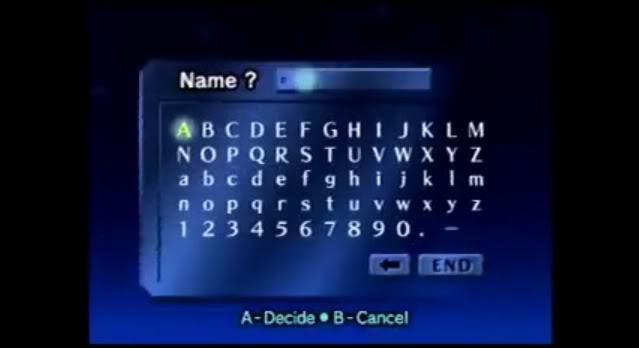Editor's note: Some centuries ago, Shakespeare rhetorically asked, "What's in a name?" While the Bard may have been referring to love and the insignificance of petty politicking, Andrew believes that a name may be the key to creating a more engaging video game. If you have any spare thoughts, Andrew would love to read them in the comments section! -Omar
I still remember getting Ocarina of Time on Christmas morning 1998 — even if that’s about all I can remember of that day. After struggling to hook up my Nintendo 64 to my grandparents’ aging television, I finally popped in the cartridge and entered the most vibrant world I’d ever experienced in a video game. It turned out I was in for quite a good time.
But before I could truly begin my journey to save Hyrule, I had to make an interesting choice — one that I doubt many think twice about, but as I will argue here, is pretty important:
I had to pick a name for my character.

Am I Link? Andrew? J-Roc?
Although many games don’t give you this option, when you do get the chance, you can chose from any number of names. Silly names like Monkey, Stephen Colbert, or a character from Trailer Park Boys have never really appealed to me. Were I to select those names, it would feel as though I was mocking something I’m genuinely trying to enjoy.
For me, this question yields only two alternatives: Do I want use the canonical name or my own name?
For years, I went with the canonical name: Link in Ocarina of Time, Magnus in Ogre Battle 64, and Cloud in Final Fantasy 7. When one wasn’t presented with an option, I tried to find a name that felt appropriate. For instance, I named my early characters in the Baldur’s Gate series Inioch (pretty sweet, despite the fact that I stole it from Age of Wonders).
I think I did this in an effort to make the experience feel as real as possible and to heighten the level of immersion in the game's mythos. But recently, I began giving in-game characters my name: Andrew. In doing so, I hoped to become more connected to the game world.
So if the same fundamental impulse is the reason for each of the two choices, what makes the difference? And how does it affect my video gaming experience?
The key issue this question speaks to is the role of the player in a video game. Is the player actually participating in the game universe? Am I Link? Or am I simply bearing witness to Link's quest?
When I pick the canonical name, I’m making a choice to take a step back from the character and see him as more of an autonomous entity. As the player, I'm still in control, but it seems like this decision more clearly delineates the boundary between his experience and mine. From one point of view, this can heighten the sense of immersion because it makes the narrative more believable. The world somehow feels more authentic when I pick the “right” name.
But on the other hand, the ultimate immersive experience is feeling like the video game is happening to you.

In games like The Elder Scrolls 4: Oblivion, creating the character — and naming him — makes me feel much more a part of the experience.
To be sure, other factors affect the type of experience each player will have. Experiencing the game from the first-person perspective can have a huge impact. Moreover, my character certainly feels more like me if I go through a character creation section. But when there is no such option, a name can represent the only way to personalize the experience.
The significance of this choice reaches far. A key element behind Roger Ebert’s argument that video games aren't artistic is the notion that video games lose authorial control when a participant has the power to make decisions. (Ebert doesn't only refer to the types of decisions we see in modern role-playing games; he indicates the choices inherent in any form of gameplay.) But if the players aren’t actually in the game — if our characters are separate from us — perhaps we have sidestepped his point.
Many argue the opposite: The unique artistic voice that video games possess is due to their ability to immerse players more deeply because of their choices.

The feeling of romance is heightened when it feels like it’s happening to you. However, it’s lost somewhat when your love interest can only address you by your rank or last name.
What I find especially interesting is that the choice of how to experience the game is largely up to the player. But I fear that it’s being taken away from us by the advent of voice acting in video games. Take the Mass Effect series, for example. While I named my character Andrew Shepard (for those who don't know, Shepard is the only option for a last name), I’m only ever addressed as Commander or Shepard. Paradoxically, the video game’s imposition of a name restricts the overall immersion that the voice acting adds.
I think technology will catch up and solve this problem one day. Using voice-parody software to create a facsimile of the actors speaking in the game, voice emulation will become advanced enough to read unique names. Unfortunately, that technology is far off. Today, the problem remains.
Regardless, this is a choice that developers have presented and will continue to present to gamers for years, and I’d like to hear from others about what they’ve done and why they’ve done it. I look forward to your comments below.


